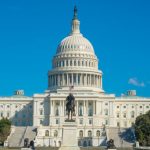Today, the House appropriations committee for the first time heard and passed language, known as the Joyce amendment, to restrict funding for the Department of Justice to prosecute state-legal medical marijuana programs.
“Today marks a victory for medical marijuana programs and a loss for Attorney General Jeff Sessions. Passage of this amendment through regular order in the appropriations committee represents another big step in the normalization of state level marijuana reform in the Congress of the United States,” said NORML Political Director Justin Strekal.
Previously, the amendment had not gone through the committee process and was inserted into the appropriations bill on the floor of the House, yet was blocked in 2017 by Rules Committee Chairman Pete Sessions, a militant marijuana prohibitionist. The amendment was offered by Representative David Joyce (R-OH).
“We thank Representative Joyce for his leadership to protect the 46 states that have reformed their marijuana policies and the over 2 million patients that they serve,” said Strekal.
Since 2014, members of Congress have passed annual spending bills that have included a provision protecting those who engage in the state-sanctioned use and dispensing of medical cannabis from undue prosecution by the Department of Justice. The amendment, previously known as the Rohrabacher-Blumenauer, maintains that federal funds cannot be used to prevent states from “implementing their own state laws that authorize the use, distribution, possession or cultivation of medical marijuana.”
Last year, Attorney General Jeff Sessions sent a letter to Congressional leadership to remove these restrictions, writing: “I believe it would be unwise for Congress to restrict the discretion of the Department to fund particular prosecutions, particularly in the midst of a historic drug epidemic and potentially long-term uptick in violent crime.”
According to recently released nationwide survey data, the majority of Americans are on our side. A whopping 93 percent support the medical use of marijuana. Perhaps most importantly, 71 percent of voters — including strong majorities of Democrats, Republicans, and Independents — say that they “oppose the government enforcing federal laws against marijuana in states that have already legalized medical or recreational marijuana.”
To date, these statewide regulatory programs are operating largely as voters and politicians intended. The enactment of these policies have not negatively impacted workplace safety, crime rates, traffic safety, or youth use patterns. They have stimulated economic development and created hundreds of millions of dollars in new tax revenue. Specifically, a 2017 report estimates that 123,000 Americans are now working full-time in the cannabis industry. Tax revenues from states like Colorado, Oregon, and Washington now exceed initial projections. Further, numerous studies have identified an association between cannabis access and lower rates of opioid use, abuse, hospitalizations, and mortality.
(317)





Leave A Reply